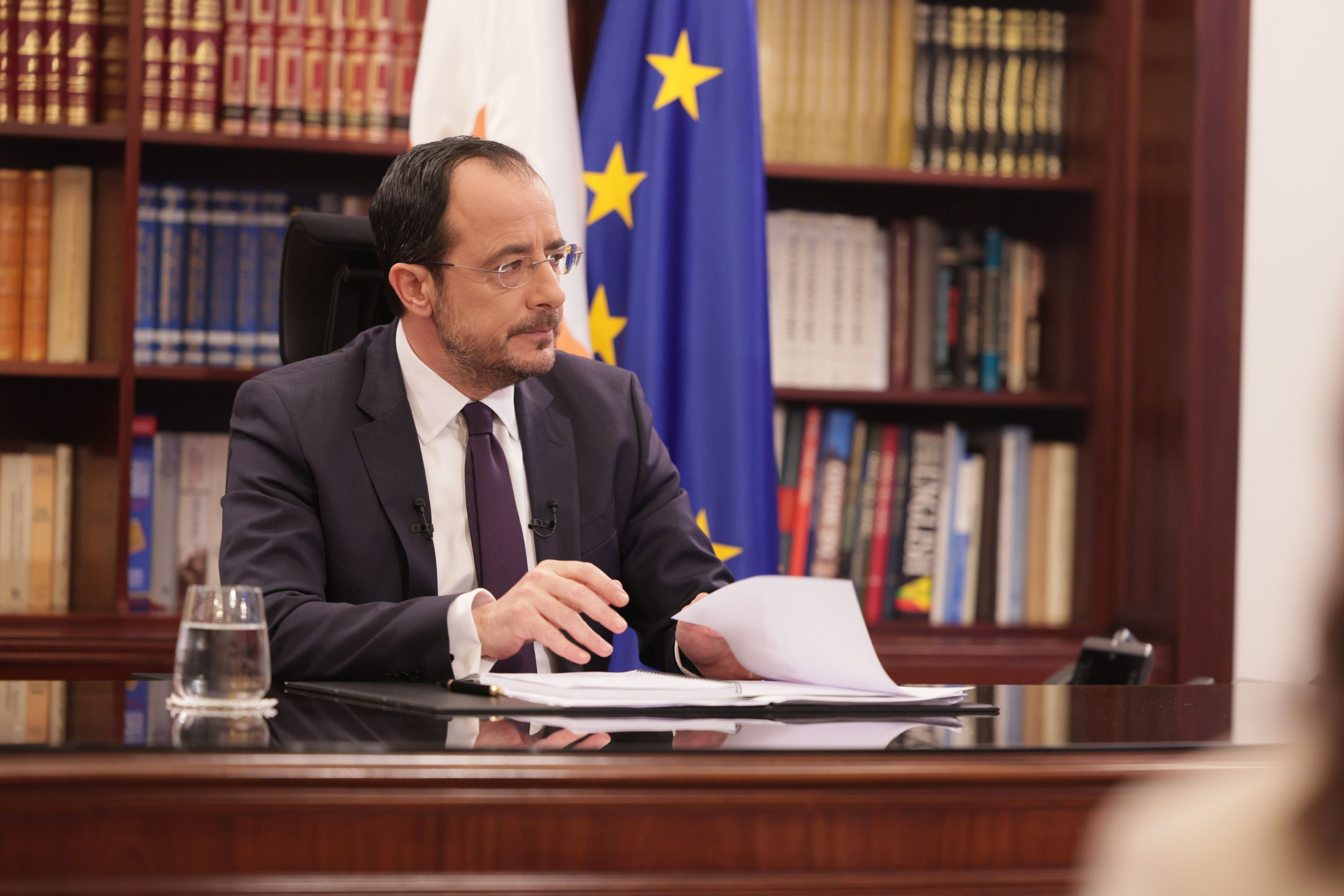“We are not under anyone’s supervision, like Tatar is with Turkey,” President Nikos Christodoulides said on Wednesday.
Speaking during a televised interview held to mark the completion of the second year of his term, he defended Greek Prime Minister Kyriakos Mitsotakis’ remark on Saturday that Greece will participate and support the Greek Cypriot side’s efforts on the Cyprus problem “to the extent to which it is responsible”.
“This statement concerns the external dimension of the Cyprus problem. The internal aspect of the Cyprus problem is our exclusive responsibility. We are not under anyone’s supervision, like Tatar is with Turkey. I do not feel abandoned at all. On the contrary, I feel very strengthened by the international climate,” he said.
Turkish Cypriot leader Ersin Tatar has long faced criticism that he is “Ankara’s man”, with his predecessor Mustafa Akinci having accused Turkish ambassador in the north Ali Murat Basceri of using the embassy as an “election headquarters” for Tatar during the 2020 election.
Opposition media has as such frequently drawn attention to the close relations between Tatar and the Turkish government, often in less than glowing terms, with newspaper Ozgur Gazete describing Tatar as “the appointed president” and Yeniduzen being known on occasion to refer to him as “the Turkish Cypriot ‘leader’”.
Looking ahead to next week’s enlarged meeting on the Cyprus problem in the Swiss city of Geneva, Christodoulides on Wednesday brushed off suggestions that the meeting will be “meaningless”.
“The United Nations Secretary-General [Antonio Guterres], having two serious crises, in Ukraine and in the Middle East, to deal with, would never go to a ‘meaningless meeting’. We are fully prepared for all scenarios … with one, and only one, specific goal: the resumption of negotiations from where they left off at Crans Montana,” he said.
He added, “whether we achieve this goal also depends on the other side”
He went on to say that Guterres “has done his due diligence” and that he would not have called the meeting if there were nothing to discuss.
“We are not going to Geneva to find ourselves in the middle. The starting point is the agreed framework. I am going to Geneva and [Guterres] is going to Geneva to achieve a result. We know what it is and what the priority is,” he said.
He added that he has not received “any reassurances from anyone” regarding the meeting, but said, “we will be judged at the negotiating table”.
Additionally, he said the European Union had also “conveyed to the UN its desire to be at the negotiating table” and that a commissioner “will probably attend”.
He also said the EU will appoint “a personality” in relation to the Cyprus problem and that there will be “developments in the coming days” in this regard.
Tatar had said on Tuesday that he “did not find it right” for the EU to attend the meeting, and thus EU involvement may constitute an early sticking point in discussions in Geneva.
Moving on from the matter of the EU, Christodoulides said that if it does not prove possible in Geneva to resume talks from where they left off in Crans Montana in 2017, “we have a second, we have a third, and we have a fourth goal”.
He also briefly touched on the Turkish government’s wish to be a part of Europe’s efforts to rearm itself, even saying the country wishes to join the European Defence Agency, the EU’s defence collaboration arm.
He added that he had offered a response to the idea verbally when he sat around a coffee table with Turkish President Recep Tayyip Erdogan and Foreign Minister Hakan Fidan at the European Political Community’s summit in Budapest last year.
“The message I conveyed to [Fidan] in Hungary was that, ‘if you wish, we re ready so long as there is a solution to the Cyprus problem’. [Fidan’s] reaction was that Turkey is a large country and will help the EU,” he said.
The enlarged meeting on March 17 and 18 and will see both Cyprus’ sides as well as representatives of the island’s three guarantor powers, Greece, Turkey and the United Kingdom, and the UN convene to discuss the Cyprus problem.






Click here to change your cookie preferences